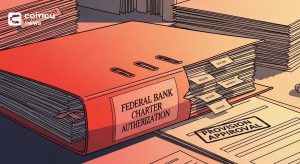President Biden Blocked Chinese Crypto Mining Firm, Citing National Security Risks
Key Points:
- President Biden blocks a Chinese crypto mining firm from owning land near a Wyoming nuclear missile base, citing national security risks.
- The order mandates the divestment of property and removal of equipment operated by MineOne Partners Ltd., partly owned by Chinese nationals, located just one mile from the missile base.
- The move aligns with broader U.S. concerns regarding China and underscores efforts to safeguard sensitive military installations from potential surveillance and espionage activities.
President Joe Biden has issued an order blocking a Chinese crypto mining firm from owning land near the Francis E. Warren Air Force Base in Wyoming, citing national security risks.

Biden Administration Blocks Chinese Crypto Mining Firm Near Wyoming Missile Base
The order mandates the divestment of property operated as a crypto mining facility and the removal of certain equipment owned by MineOne Partners Ltd., a firm partly backed by Chinese nationals.
The property, located just one mile from the missile base, was acquired by MineOne Partners Limited, majority-owned by China, in June 2022. Changes were made to accommodate a Chinese crypto mining operation, prompting concerns from the U.S. Treasury Department.
The move aligns with the U.S.’s broader stance on China, as the nation is set to impose major tariffs on electric vehicles, semiconductors, solar equipment, and medical supplies imported from China.
CFIUS Coordination Highlights Surveillance Risks and U.S.-China Relations
The order was issued in coordination with the U.S. Committee on Foreign Investment in the United States (CFIUS), which reviewed the transaction and identified national security risks, including surveillance concerns. Treasury Secretary Janet Yellen emphasized CFIUS’s role in safeguarding national security and ensuring foreign investments do not compromise sensitive military installations or technologies.
While the specifics of the national security concerns were not disclosed, the Treasury Department highlighted issues with specialized and foreign-sourced equipment capable of facilitating surveillance and espionage activities.
Notably, the purchase was not initially filed with CFIUS, as required, prompting the committee to act upon receiving a public tip.
The divestment order underscores ongoing efforts to address national security risks associated with foreign investments, particularly those impacting sensitive military infrastructure.
| DISCLAIMER: The information on this website is provided as general market commentary and does not constitute investment advice. We encourage you to do your own research before investing. |






















